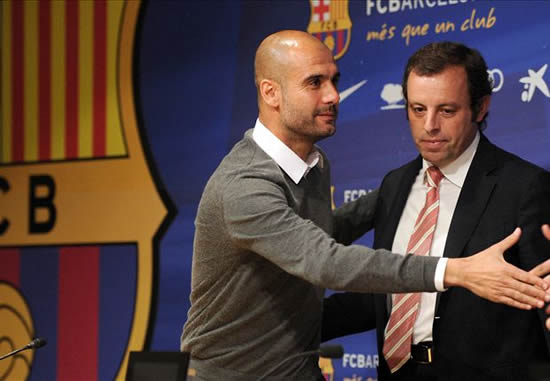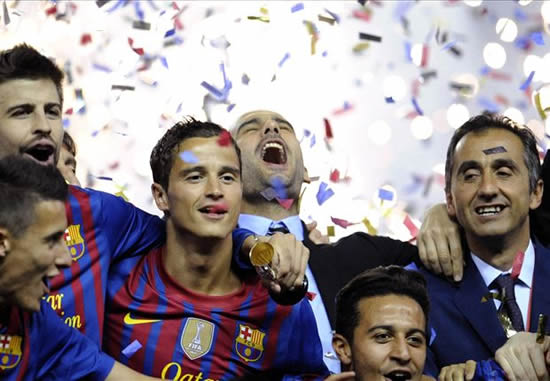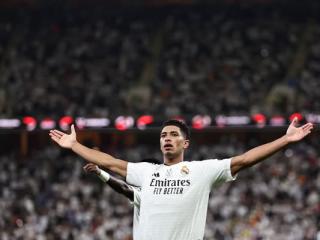The real reason why Guardiola left Barcelona
Posted Saturday, October 18, 2014 by Goal.com

This extract from Marti Perarnau's new book on Pep Guardiola reveals the truth behind the Catalan coach's decision to part company with his boyhood club in the summer of 2012
BOOK EXTRACT
By Marti Perarnau
New York, October 2012
“Prepare yourself, Manel. I’ve chosen Bayern!”
In Pescara, in the north-east of Italy, Manel Estiarte (Pep Guardiola's personal assistant) smiles. Hard though it had been for his old friend to close one chapter of his life, the decision about his next step had obviously been an easy one. Their destination would not after all be England, but Germany.
The exchange is taking place five months after Pep’s departure from Barca. In this time, he has been flooded with offers: Chelsea, Manchester City, AC Milan and, of course, Bayern. In reality, they are not job offers, but love letters, project proposals for this most illustrious of coaches.
The departure from Barca had been long and difficult and Guardiola had shared his plans with his friend Estiarte before speaking to the club, or even to Tito Vilanova, his deputy and successor. The reason was pretty straightforward. After four years at maximum intensity, Pep was drained. He had no more to give.
This was not the only reason, of course.
Over his four-year tenure, Pep had been expected to act as coach, club spokesperson, virtual president and even travel co-ordinator. During that time he had also struggled to remain on good terms with two successive presidents.
He had found in Joan Laporta a dynamic but pushy man who possessed volcanic energy and who could be supportive one minute and undermining the next. Electric, contradictory – occasionally lewd.
Sandro Rosell was different and Pep quickly discovered that the new president’s smiling demeanour concealed the cold, treacherous heart of a bureaucrat. Guardiola balanced the at-times hysterical behaviour of Laporta with his own calm sobriety. He coped with Rosell’s sanctimonious posturing by injecting an overdose of his own energy.
Relations with neither president were simple. Pep managed to deal calmly and quietly with Laporta’s histrionic outbursts. Although the two men were not close, the coach appreciated the opportunities the president had given him. Laporta had initially appointed Guardiola as Barcelona B coach and Pep had been hugely successful there, bringing the team up from the tough Third Division, an achievement he still considers one of his greatest successes. His gratitude to Laporta was absolutely sincere and also extended to the sports director, his old colleague from Cruyff’s 'Dream Team', the elusive winger, Txiki Begiristain.
The triumphs of Laporta’s period in charge, however, concealed the struggles and skirmishes going on behind the scenes.
At times Pep felt like the captain of a ponderous ocean liner as he fought to steer the team in one direction whilst the club pulled in the other. No decision was straightforward, whether it involved transferring training sessions to the new training ground, making sure his technical staff had the same sponsored cars as the squad, organising publicity shots or agreeing the club’s official position on any issue. FC Barcelona was a vast machine that moved to a rhythm and leadership style that had little to do with the way Guardiola managed his team.
However, by early 2010 Guardiola sensed that things were about to take a turn for the worse. Presidential elections were looming that summer and Sandro Rosell was the favourite to win. Rosell had been vice-president from 2003 to 2005, until disagreements with Laporta forced him to resign.
Under Laporta, the Catalan coach had won all six titles: La Liga, the Copa del Rey, the Champions League, the European and Spanish Supercups and the Club World Cup. Rosell won the elections with an overwhelming majority and his arrival added a sense of animosity and resentment to the already complex bureaucratic difficulties which plagued life at the club.
In private, the new president referred to Pep as the Dalai Lama. Believing his coach to be a Laporta devotee, he was slow to trust him and resented the fact that the team had peaked too early by winning the six trophies during his predecessor’s reign. The gulf between president and coach became unbreachable when Rosell persuaded the club’s general assembly of members to vote in favour of taking legal action against Laporta. Rosell was smart enough to abstain from the vote himself, but for Guardiola it was the beginning of the end.

Leaving present | Guardiola signs off with Copa del Rey glory
For four years, Pep demanded unstinting effort from his players. Nothing but their best would do and at times his exacting standards caused friction within the group. Many of the players were unfazed by the relentless work rate, but some felt they had earned the right to relax a bit. They were the elite of world football, after all, and they had the trophies to prove it. More than one of Pep’s men were now interested in contesting only the important games and they began to make excuses to avoid the kind of grim, uninspiring winter matches which were played on cold, inhospitable pitches. To add to Pep’s woes, one new signing in particular was failing to live up to expectations.
Despite the team’s continuing success, Pep knew that his time at Barça was nearing its end. “The day I see the light go out of my players’ eyes, I’ll know it’s time to go.”
By early 2012, some eyes were already a little less bright.
People around FC Barcelona have often claimed that Pep’s decision to leave was influenced by Sandro Rosell’s lack of support for his plans to make drastic changes to the squad. Plans which apparently included selling players like Gerard Pique, Cesc Fabregas and Dani Alves.
The Catalan coach flatly denied this when we spoke: “It’s just not true. I left Barcelona because I was worn out. I explained how I felt to the president in October 2011. There was no change of heart after that. So it would have made no sense at all for me to start changing the squad. I knew I was leaving!
“The facts of the matter are that we won four titles that year and were playing better than ever, with the 3-4-3 we used against Real Madrid and the 3-7-0 I opted for in the Club World Cup. We were playing brilliantly but I was on my knees and had no new tactical ideas left. That was why I left. There was no other reason.”
Photos
More»Sexy bikini model Devin Brugman
Friday January 10 2025[PICTURE SPECIAL] Real Madrid 3 - 0 Mallorca
Friday January 10 2025Stunning Love Island host beams with pride
Thursday January 09 2025



Your Say